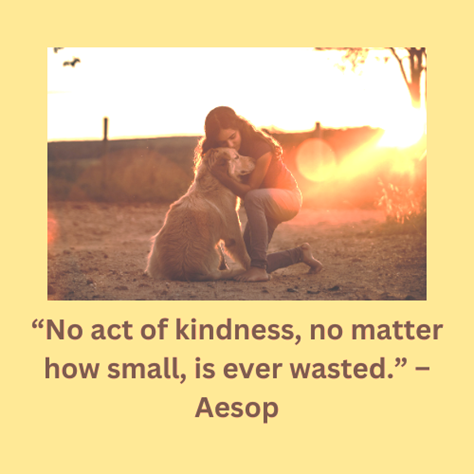by Adapt Training and Development

In her lovely article titled “The Power of a Little Kindness,” Psychologist and author Gretchen Schmelzer writes: “We tend to think of kindness as being nice, but it is so much bigger than that. Kindness is being what is needed . . . it feels like something you can lean on, like you are being held.”
Receiving kindness
It helps to really stop and notice the kind things that other people do for us. Maybe it’s a random act of kindness (the stranger ahead of us in the coffee line pays for our latte – always nice!). Maybe it’s something as simple as someone holding a door for us or picking up something that we didn’t notice we had dropped. Maybe it’s a loving habit that someone in our family does regularly. When it’s icy in the winter and my husband scrapes my car while he’s clearing his, it feels like a terrifically kind gesture. Hanging on to these little gems, like reflecting on the things we are grateful for, can help bolster our overall well-being. This is a short, sweet story from NPR’s Unsung Heroes series about a small moment with a big impact. Similarly, in this article from the Harvard Health Blog, the author reflects on a compliment she received 40 years earlier when she was a shy and insecure freshman. Talk about a lasting impact!
Showing kindness
There has been quite a bit of research in the last decade that demonstrates how kindness is good for us. An article from Greater Good cites research that suggests “people who were kind tended to have higher self-esteem and a sense of self-efficacy” (the feeling of having control and influence over our own lives). “To a lesser degree, they also experienced less depression and anxiety and improved physical health—with the links to health being strongest in older adults.” The Harvard Health Blog article (referenced above) notes that kindness gets easier, the more we practice it—and that kindness is contagious. Often, our experiences with hardship and loss may make us kinder, as this poem by Naomi Shihab Nye stresses. It starts, “Before you know what kindness really is you must lose things, feel the future dissolve in a moment like salt in a weakened broth.” Should you like some ideas, here are 18 acts of kindness that don’t cost money.
Being kind to ourselves
Gretchen Schmelzer writes that kindness is “giving yourself what you need.” Perhaps we should develop a practice of checking in with ourselves, especially when we are lagging, and ask what do I need right now? Do I need to take a walk? Talk to a friend? Go to bed early? Drink some water? Have a lazy Saturday? Eat cereal for dinner instead of cooking? Give myself grace for a mistake? Doing what we need – and not criticizing ourselves for it (all the things we tell ourselves we “should” have done instead) is a good practice. Here are more ideas for being kind to ourselves from PsychCentral.